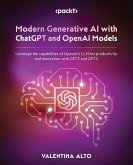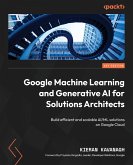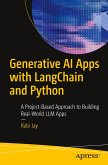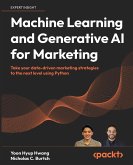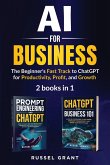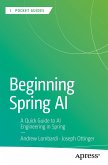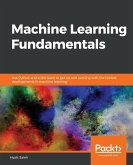Begin your generative AI journey with Python as you explore large language models, understand responsible generative AI practices, and apply your knowledge to real-world applications through guided tutorials Key Features: - Gain expertise in prompt engineering, LLM fine-tuning, and domain adaptation - Use transformers-based LLMs and diffusion models to implement AI applications - Discover strategies to optimize model performance, address ethical considerations, and build trust in AI systems - Purchase of the print or Kindle book includes a free PDF eBook Book Description: The intricacies and breadth of generative AI (GenAI) and large language models can sometimes eclipse their practical application. It is pivotal to understand the foundational concepts needed to implement generative AI. This guide explains the core concepts behind -of-the-art generative models by combining theory and hands-on application. Generative AI Foundations in Python begins by laying a foundational understanding, presenting the fundamentals of generative LLMs and their historical evolution, while also setting the stage for deeper exploration. You'll also understand how to apply generative LLMs in real-world applications. The book cuts through the complexity and offers actionable guidance on deploying and fine-tuning pre-trained language models with Python. Later, you'll delve into topics such as task-specific fine-tuning, domain adaptation, prompt engineering, quantitative evaluation, and responsible AI, focusing on how to effectively and responsibly use generative LLMs. By the end of this book, you'll be well-versed in applying generative AI capabilities to real-world problems, confidently navigating its enormous potential ethically and responsibly. What You Will Learn: - Discover the fundamentals of GenAI and its foundations in NLP - Dissect foundational generative architectures including GANs, transformers, and diffusion models - Find out how to fine-tune LLMs for specific NLP tasks - Understand transfer learning and fine-tuning to facilitate domain adaptation, including fields such as finance - Explore prompt engineering, including in-context learning, templatization, and rationalization through chain-of-thought and RAG - Implement responsible practices with generative LLMs to minimize bias, toxicity, and other harmful outputs Who this book is for: This book is for developers, data scientists, and machine learning engineers embarking on projects driven by generative AI. A general understanding of machine learning and deep learning, as well as some proficiency with Python, is expected. Table of Contents - Understanding Generative AI: An Introduction - Surveying GenAI Types and Modes: An Overview of GANs, Diffusers, and Transformers - Tracing the Foundations of Natural Language Processing and the Impact of the Transformer - Applying Pretrained Generative Models: From Prototype to Production - Fine-Tuning Generative Models for Specific Tasks - Understanding Domain Adaptation for Large Language Models - Mastering the Fundamentals of Prompt Engineering - Addressing Ethical Considerations and Charting a Path Toward Trustworthy Generative AI
Bitte wählen Sie Ihr Anliegen aus.
Rechnungen
Retourenschein anfordern
Bestellstatus
Storno



